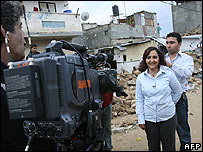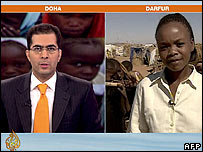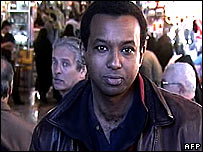|
By Torin Douglas
Media correspondent, BBC News
|

Al-Jazeera is one of the best-known TV stations in the world - yet its new channel's first few hours on air may have surprised those who know it only from the headlines.

Al-Jazeera hopes to lend a new perspective to reporting
|
Slick and polished, with familiar faces from British TV news bulletins, it carried reports from across the globe, including many places rarely seen on our screens.
Two years ago, al-Jazeera was named in the global InterBrand survey as the world's most influential media brand and the fifth most influential in any field, after Apple, Google, Ikea and Starbucks.
Yet to millions of people who do not follow the news media closely, that fame has been earned for the wrong reasons. To them, al-Jazeera has a very dubious reputation.
In its 10 years on the air, it has rarely been far from controversy.
Donald Rumsfeld called al-Jazeera's coverage of the Iraq war "vicious, inaccurate and inexcusable" after it showed pictures of captured American soldiers.
The clip was broadcast in the new channel's first few minutes on air - almost like a battle-honour - as it laid out its mission to report world news from a Middle East perspective and challenge the dominance of Western media.
Bin-Laden scoop
The former US defence secretary was not al-Jazeera's only critic.

The channel has reporters in areas ignored by other networks
|
Air Marshall Brian Burridge was equally forthright after the channel showed pictures of dead British soldiers.
He condemned "the shocking close-up pictures broadcast by al-Jazeera" as "a disgraceful and flagrant breach of the Geneva Convention".
And of course there were the international rows over its exclusive tapes of Osama Bin Laden - the broadcasts which brought it to the world's attention, after the 11 September attacks and the US air strikes on Afghanistan.
The station has always denied acting as Bin Laden's mouthpiece - insisting the tapes were, and remain, a scoop any news channel would have run.
The reason it got them, it said, was that it had a studio and a satellite uplink facility in the Afghan capital, Kabul.
'War is gruesome'
Al-Jazeera never set out to be this controversial, though it always knew it would ruffle feathers.
The station was launched 10 years ago, funded by the Emir of Qatar who had a vision of an unbiased Arabic TV channel, independent of governments, striving to present all points of view.
Many of its early staff came from the BBC World Service, and they retained their notions of objectivity and balance.
With little tradition of media independence in that part of the world, al-Jazeera's reporting has upset governments in the Middle East as much as those in the West.
Now, as it launches its English-language news channel - the first to be broadcast from the Middle East - it hopes it will become better known for its overall news coverage, particularly of the developing world.
Sue Phillips, its London bureau chief, says the new channel will build on the independent traditions of the Arabic al-Jazeera, but it will have a different culture.
"We have very strict journalism guidelines," she says.
"We come under the UK media regulator Ofcom, we will adhere to Western broadcasting standards, we will report accurately, impartially and objectively - and we will be controversial where necessary."
She says al-Jazeera Arabic is culturally different, which helps explain its use of footage that was condemned in the West.
But she insists that, while adhering to Western standards, al-Jazeera English will not sanitise war in its picture coverage.
"War is gruesome, but we have a very senior editorial board who will decide what images can be shown on the screen."
'Influential viewers'
Al-Jazeera says its new channel will demonstrate its independence and give a fresh perspective on the world's news.

Former BBC reporters such as Rageh Omaar have been recruited
|
Its staff come from 40 countries, including well-known names from the BBC, ITN, Sky and other broadcasters around the world.
Sir David Frost has his own show, as has Rageh Omaar, who reported for the BBC from Baghdad - both chosen, one suspects, to emphasise the difference between this channel and the image which many viewers have of al-Jazeera.
Professor Stewart Purvis of London's City University, formerly editor-in-chief of ITN, says the new channel will attract influential viewers:
"I think it will be watched by governments and by people who are interested in trying to detect any message that is coming from the Arab world which they may not have picked up in other ways and which, unless they speak Arabic, they're not necessarily going to detect."
But attracting a wider audience may not be so easy, in a world with so many other sources of news.


~RS~q~RS~~RS~z~RS~32~RS~)